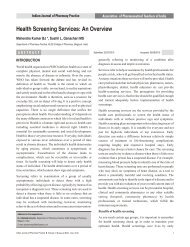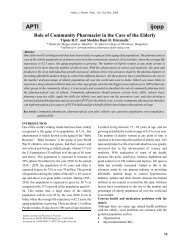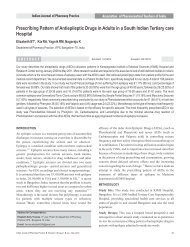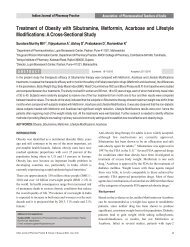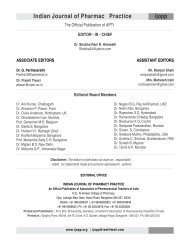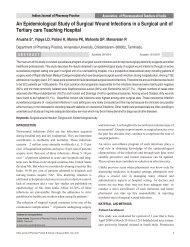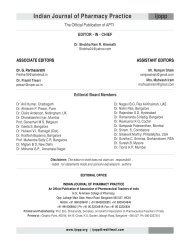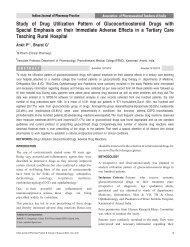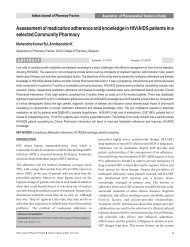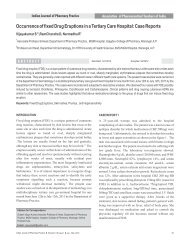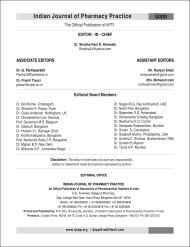Jul-Sep, 2012 - Indian Journal of Pharmacy Practice
Jul-Sep, 2012 - Indian Journal of Pharmacy Practice
Jul-Sep, 2012 - Indian Journal of Pharmacy Practice
You also want an ePaper? Increase the reach of your titles
YUMPU automatically turns print PDFs into web optimized ePapers that Google loves.
<strong>Indian</strong> <strong>Journal</strong> <strong>of</strong> <strong>Pharmacy</strong> <strong>Practice</strong>Association <strong>of</strong> Pharmaceutical Teachers <strong>of</strong> IndiaProspective Monitoring and Reporting <strong>of</strong> Adverse Drug Reactions associated with Antiplateletand Antiepileptic Drugs in a South <strong>Indian</strong> Tertiary Care Teaching Hospital1 1 2 3 4 4Varun T , Sebastian J , Ramesh A* , Narahari MG , Keshava Bs and Harsha S1Department <strong>of</strong> <strong>Pharmacy</strong> <strong>Practice</strong>, Talla Padmavathi College <strong>of</strong> <strong>Pharmacy</strong>, Warangal2Department <strong>of</strong> <strong>Pharmacy</strong> <strong>Practice</strong>, JSS College <strong>of</strong> <strong>Pharmacy</strong>, Mysore.3 4,5Department <strong>of</strong> Medicine, Department <strong>of</strong> Nuerology, JSS Medical College Hospital, Mysore.A B S T R A C TSubmitted: 17/03/<strong>2012</strong>Accepted: 25/06/<strong>2012</strong>A prospective monitoring <strong>of</strong> adverse drug reactions associated with antiplatelet and antiepileptic drugs was carried out in a tertiary care teachinghospital. Patients diagnosed with Acute Coronary Syndrome (ACS) or ischemic stroke receiving antiplatelet drugs (Aspirin and Clopidogrel) andepileptic patients receiving antiepileptic drugs were followed for a period <strong>of</strong> six months prospectively at a tertiary care teaching hospital. WHOprobability scale and Naranjo's algorithm, Modified Hartwig and Seigel scale, and Modified Shumock and Thornton scales were applied to assessthe causality, severity and preventability <strong>of</strong> the reported ADRs. At the end <strong>of</strong> the study period, 15 ADRs were observed with Aspirin and 14 ADRswere observed with Clopidogrel in antiplatelet agents' class and 24 ADRs with Phenytoin and 12 ADRs with Valproic acid in antiepileptic agents'class. Among the antiplatelet agents, 82.75% <strong>of</strong> ADR's were found probable and 37.93% ADRs were possible. In antiepileptic drug class, 73.33%ADRs were found probable. In assessment <strong>of</strong> severity level, 6 ADRs were found in severity level 1 and 20 ADRs were in level 3 in severity inantiplatelet agents class and in antiepileptic drugs class 9 ADRs were found in level 1 and 23 ADRs were found level 2 severity, and 15 ADRs werefound preventable in anti epileptic agents. Medications were discontinued in 14 cases and the dose was adjusted in 10 cases. Phenytoin andSodium Valproate were found responsible for majority ADRs in Anti epileptic drugs class and Aspirin accounted for more number <strong>of</strong> ADRs inantiplatelet agents' class.Keywords: Adverse Drug Reactions, Antiplatelets, Antiepileptic drugs.INTRODUCTIONWorld Health Organization defines ADR as a response to adrug that is noxious and unintended and occurs at dosesnormally used in man for the prophylaxis, diagnosis, andtherapy <strong>of</strong> disease, or for modification <strong>of</strong> physiological1function. Adverse drug reactions (ADRs) occur frequently inmodern medical practice due to various pre disposing factors,resulting in increasing the morbidity, mortality and cost <strong>of</strong>care. Worldwide clinically significant ADRs occurapproximately in 20% <strong>of</strong> hospitalized patients and found to be2the fourth leading cause <strong>of</strong> mortality.Patients with cardiovascular diseases and epilepsy areparticularly vulnerable to ADRs due to their advanced age,polypharmacy, pathophysiology <strong>of</strong> the disease, age relatedchanges in liver and kidney function and the influence <strong>of</strong> heartdisease on drug metabolism. The ADR potential for aparticular drug varies with the individual, the disease beingAddress for Correspondence:Dr. Ramesh Adepu, Pr<strong>of</strong>essor, Department <strong>of</strong> <strong>Pharmacy</strong> <strong>Practice</strong>, JSS College<strong>of</strong> <strong>Pharmacy</strong>, SS Nagar, Mysore – 570 015E-mail: adepu63@gmail.comtreated, and the extent <strong>of</strong> exposure to other drugs. Majority <strong>of</strong>significant ADRs involving cardiovascular drugs are2, 3predictable and therefore preventable.Across the world, after the stroke and the dementia, epilepsyconstitutes the common neurological condition seen by4neurologists in elderly. In India approximately 5.5 millionpeople are suffering from Epilepsy, among them 4.1 millionpatients resides in rural area and every year half million new5patients are added to the existing list. The ultimate goal <strong>of</strong> theepilepsy treatment is to make the patient free from seizureswithout adverse effects <strong>of</strong> medication and improved quality<strong>of</strong> life. Over 80% <strong>of</strong> patients may achieve seizurefree statewith one suitable antiepileptic medication. But the remaining20% <strong>of</strong> patients may require poly therapy for seizure control.Majority antiepileptic agents suppress the pathologicalneuronal hyper excitability that constitutes the finalsubstrates in many seizure disorders was considered to beresponsible for adverse drug reactions. The other drug relatedproblems such as drug interactions also contribute to Adverse6Drug Reactions that may add to the economic burden.Assessing and resolving the potential drug related problemssuch as ADRs will improve the therapeutic outcomes and alsohelps in improving patients' quality <strong>of</strong> life.<strong>Indian</strong> <strong>Journal</strong> <strong>of</strong> <strong>Pharmacy</strong> <strong>Practice</strong> Volume 5 Issue 3 <strong>Jul</strong> - <strong>Sep</strong>, <strong>2012</strong> 20



